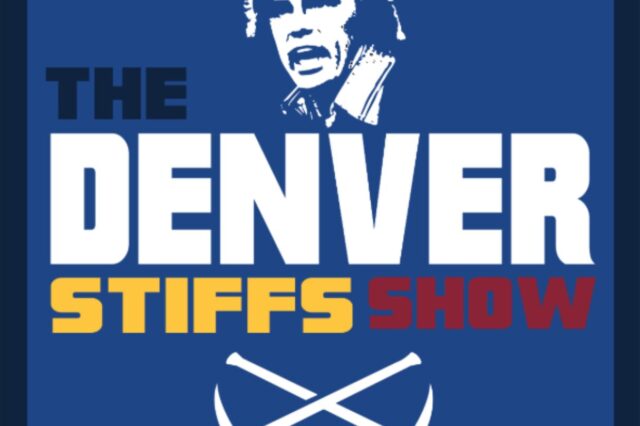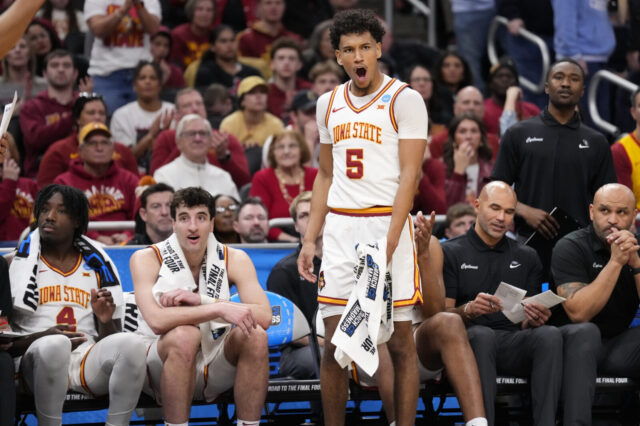The question at the forethought of the minds of many Denver Nuggets fans this offseason: what’s next for Jamal Murray?
The answer truly is, we don’t know. Internally, the Nuggets are excited about his development and believe they have the next truly dynamic NBA duo in Murray and star center Nikola Jokic. Both players carried the load during the playoffs last season, averaging more than 46 points per game between the two of them and occasionally serving as the only reliable offensive options. Externally, the Nuggets have projected confidence in their young duo, committing to Jokic during the 2018 offseason and to Murray this past offseason. Murray signed a $170 million max extension this past offseason on the very first day the Nuggets could offer the money to him.
There was no squabbling over the final totals like there are in the case of many rookie extensions. The Nuggets gave Murray a contract that will pay him similarly to Karl-Anthony Towns, Ben Simmons, Joel Embiid, and Nikola Jokic during the 2020-21 season. All four of those players have made an All-Star game, and three have earned All-NBA honors. Murray is at a different stage in his development than above players, though he may not be as far away as some think.
The number of players to average 20 points and four assists per game in their Age-21 season or younger is fairly low. The number of players to accomplish the feat across two separate rounds or more is even lower. Only LeBron James, Kobe Bryant, Bradley Beal, Donovan Mitchell, and Jamal Murray have accrued those numbers at such a young age, and giving a max contract to any of those players would be understandable given the circumstances. Guards, especially point guards, tend to blossom later than their forward and center counterparts.
But the Nuggets are certainly taking a chance with Murray as the second star, even factoring in the positive indicators for his progression and Denver’s willingness to commit to him. Very few players receive a max contract at 22 years old, and Murray has a lot to prove. Let’s dive into the ways Murray can take a leap this season:
Scoring Consistency
The peak of Jamal Murray’s powers is a star caliber player. He proved this many times over during the regular season and the playoffs, exploding for massive performances in times of need for Denver; however, there’s one aspect of being a lead guard that Murray is still learning: consistency.
There are a variety of ways to show the concept of consistency, and perhaps the best way is an illustration of Murray’s 2018-19 Game Scores on Basketball Reference when compared to other lead guards:
This content is no longer available.
In the above graph are the game score distributions for five point guards including Murray, three other young point guards (De’Aaron Fox, D’Angelo Russell, Trae Young) and a superstar guard in Damian Lillard as a baseline for success. Across a full season, Lillard clearly stands out as the most effective of the five using the Game Score metric, while the other four circle around each other. When we take a closer look however, Murray looks more unfavorable compared to his counterparts:
This content is no longer available.
Don’t be alarmed by the wall of red below Murray though, as he serves as a secondary playmaker on a playoff team rather than the primary playmaker and has less opportunities to facilitate for others. The game score metric is manipulated by this, and if Murray simply averaged two more assists per game, he would leapfrog De’Aaron Fox and Trae Young in some categories. This also ignores the impressive postseason Murray had, in which his Game Score average increased to 15.56, higher than each of the other point guards’ regular season averages above.
However, the above numbers are still very real. Murray has a path to becoming a top 10 point guard every single night, but he wasn’t that guy last year. The shooting efficiency dropped tangibly and he never had a month in which he eclipsed 57% True Shooting. That’s the mark of every elite offensive point guard. No truly elite player fell below that during the season under any circumstances, and if the Nuggets see Murray as a Damian Lillard or Kyrie Irving level contributor, then he needs to shoot the ball better.
Part of the shooting consistency comes from making the most of open opportunities. In Denver’s offense, the easiest way to measure this is both on catch and shoot jumpers (C&S) and in uncontested shooting possessions. During the 2017-18 season, Murray made 42% of his catch-and-shoot threes, averaging 3.1 attempts per game. Those numbers dropped to 39.3% and 2.7 attempts per game in 2018-19. This wasn’t a sizable drop, but with Murray shouldering more of a ball handling role in Denver’s offense this past season, he had less opportunities to simply shoot an open jumper. For reference, Damian Lillard only attempted 2.5 C&S threes per game as the primary playmaker for the Blazers, while Stephen Curry attempted 6.7 C&S threes per game while running around screens. There are different ways to allow the shooters with the most gravity to get free, and it wouldn’t surprise me if the Nuggets decided to work in Gary Harris as a playmaker for Murray off screens on occasion to take advantage.
The next piece, clean, uncontested jumpers, comes in many forms, from a pull-up jumper out of a pick and roll where the defense sags off, to an open C&S three, to free throws. Over 58% of Murray’s three-pointers came on shot attempts that were classified as wide open, on which Murray only shot 38.6%. For an elite shooter, this mark just isn’t good enough. Among the guards that were more efficient than him on wide open threes were Curry, Lillard, Beal, Donovan Mitchell, Kemba Walker, and D’Angelo Russell. For a player with such an easy and repeatable shooting stroke, these should be layups in the coming years for Denver’s aspiring star.
Statistically, if Murray didn’t change anything else from last year except approached making 40% of his total three-pointers and 90% of his free throws, his 18.2 points per game would rise to 18.9 points without changing any volume, and I expect him to take more shots and utilize more possessions on average than he did last season. A healthy rise in volume and efficiency would help him cross the 20 points per game threshold indicative of most great scorers in the NBA today. Anything below that for Murray and he would probably be disappointed in his season.
Playmaking
It isn’t only scoring volume and efficiency that Murray can improve, though that is the most important path for him to turn from a good to a great player. Becoming a great passer will also help him. He doesn’t have natural point guard vision, but he does have the size and scoring gravity to help generate easy scoring opportunities for those around him.
During 2017-18, Murray played more of a combo guard role and averaged just 3.4 assists per game. That number jumped up to 4.8 assists per game in 2018-19 while Murray actually lowered his turnover rate. This was great progress and allowed Denver to play mistake free basketball as a team. The Nuggets averaged the 11th lowest turnover rate in the NBA last year, which helped make up for a drop in shooting efficiency as a team. Murray is more conducive of lower turnover numbers than Jokic is, even though Jokic is the team’s primary playmaker. Murray gets the play started the majority of the time, and him getting the ball to Jokic cleanly and with purpose allows Jokic to work his magic.
As I have mentioned before though, Murray must learn to make more complex reads if the Nuggets are to run a traditional offense with Murray and Jokic frequently in the pick and roll. Very seldom does Murray make skip passes in the half court as he stays in his comfort zone of pick and pop passing or interior passing to Jokic.
The Nuggets will be able to create more assist opportunities for Murray with designed sets that add a lift on the backside of the play like Juancho Hernangomez does above. All Mikal Bridges wants to do is crash the paint on Jokic rolling to the front of the rim, but if Murray works in a read where he hits Hernangomez, that could lead to wide open jump shots for Nuggets wings/forwards and more frequent assists for Murray.
In addition, as Murray becomes more comfortable handling the ball, he must put more pressure on the front of the rim. Too often his passes come from a tough angle across the length of the free throw line to Jokic in a small window of space. If Murray can consistently hit that window, then more power to him. Jokic has excellent hands and will catch that pass more frequently than most bigs. The phrase “work smarter, not harder” comes to mind here though as Murray can continue to get downhill and use the floater he is developing or dump off an open pass to the roll man instead.
It wouldn’t surprise me if Murray cracked six assists per game next season. My guess is he will settle at around 5.5 assists per game based on his progression and the Nuggets offense, but if he decided to get more players involved as opposed to using those scoring opportunities he generates for himself, then over six assists isn’t out of the question. He will have more responsibilities with the ball in his hands this year, so it’s definitely possible.
Defense
This one is the most self-explanatory. Murray struggled on defense last year both in the regular season and the playoffs. Denver was forced to altar their starting lineup in the middle of the playoffs for two reasons: first, Will Barton was really struggling, and second, Jamal Murray couldn’t guard Derrick White. Those woes continued into the Portland series where Murray struggled to match up with Rodney Hood while Harris and Torrey Craig matched up with Lillard and CJ McCollum. It’s one of the reasons why Denver didn’t advance to the Western Conference Finals.
Murray has the size and the frame to be able to match up with most guards reasonably well, and he tries very hard to get things right. This isn’t an apathy issue like James Harden had before he became serious about defense. The thing is, Murray isn’t the caliber of offensive talent a player like Harden or Stephen Curry is to justify being awful on defense. He has to consistently offer his services and play a strong team defense concept. If he can’t ever do that, then it’s possible that the Nuggets will never get the return on investment to which they already committed so much.
The fact is, Murray’s steal numbers are really poor for a starting guard. There aren’t very many good defenders on this list, and if Murray wants to be a great player, he must become smarter defensively. For many years of his career, Damian Lillard was a poor defender, but he left behind that stigma by building up his body, putting in consistent effort, and being as smart of a defender as he can. Sometimes, that’s all it takes.
Denver has Gary Harris to take many of the tougher assignments, just like the Warriors have Klay Thompson to help out Curry and a team like the Boston Celtics used Marcus Smart to assist Kyrie Irving last year. If Murray is to defend shooting guards frequently though, he must continue to build strength. Cross matching hurt the Nuggets in the playoffs because the alternative would have been way worse. If Murray has serious aspirations about becoming a championship contender and leading a team to the NBA Finals, then he has to figure out a way to solve that problem. Either become better as a cross match option or improve defending point guards straight up.
Either scenario would help make him a better player.
This content is no longer available.
I’ve said this before, but I believe in Jamal Murray. He’s never going to be the quickest player or the most athletic on the floor, but he has the work ethic and drive to improve in the areas necessary to become a great player. Great guards take the reins and become a leader both vocally and by example, and this is the year for Murray to start assuming some leadership responsibility. Jokic is the best player and nobody will question that, but having someone to take pressure off of the big Serbian center consistently will help diversify Denver’s offense, forcing opponents to stop loading up on Jokic and start considering Murray a threat to score 40 points every night.
Murray can put pressure on opposing defenses in a big way by playing with that mindset, but ultimately, it’s about making shots and making the right decisions on both ends of the ball. Can Murray shoot a high percentage from beyond the arc? Can he hit the open man with a difficult pass in an important moment? Can he improve defensively?
Can Jamal Murray take the leap the Nuggets so desperately need him to?


